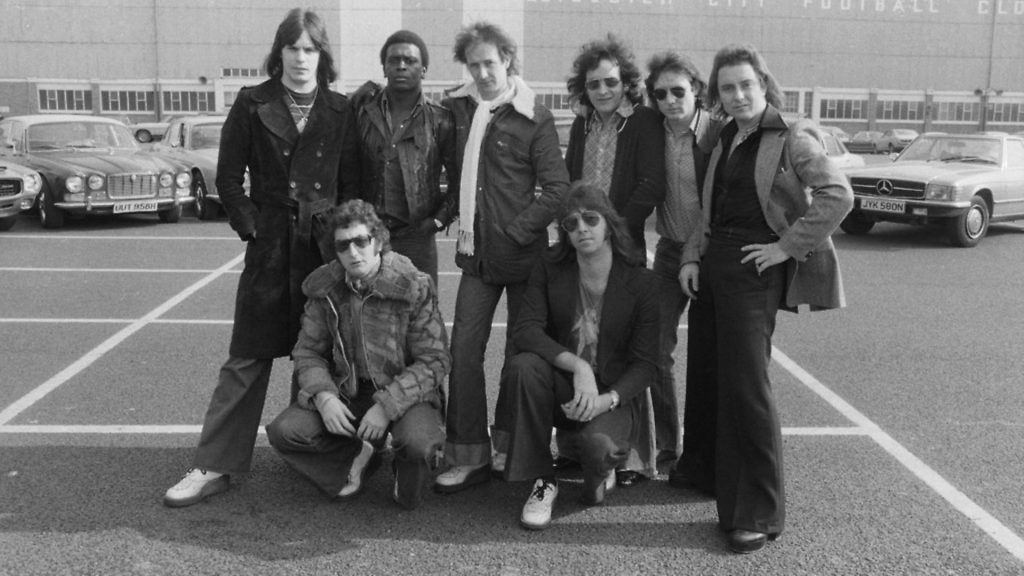
SOPHIA DEBOICK on the Midlands city that helped launch the careers of many acts from elsewhere, as well as plenty of its own.

Despite a rich history as a Roman settlement, Parliamentarian stronghold and then an industrial powerhouse, the seat of the rebel Lord of Leicester Simon de Montfort, and the burial place of both Cardinal Wolsey and Richard III, Leicester has the reputation of being an underdog – just another identikit urban centre in the indistinct Midlands. As the city became the first to suffer a second lockdown this summer and its image took a knock as the conditions in its fast fashion factories were blamed, it had reason to feel sorry for itself. And as some music venues reopened in the rest of the country, those in Leicester remained silent, yet the city’s live scene was once the stuff of legend, launching some of the biggest British acts ever.
The original Leicester scene was all about the working men’s club. Many were like the Spinney Hill Club on Frisby Road, tracing their history back to the late Victorian era and seeing their heyday in the 1960s, when membership among the local textile and garment factory workers reached a peak. One act who knew the working men’s club circuit in Leicester well was the singer and saxophonist Gerry Dorsey – later known as Engelbert Humperdinck.
One of a family of 10, Dorsey was from the inner-city Highfields district of Leicester and had attended Melbourne Road School, but he had the exotic cachet of having been born in Madras where his soldier father was posted in the 1930s. By the time he performed to a lunchtime audience of 200 at the Spinney Hill Club in 1965, Dorsey had already faced a long uphill struggle in the music business.
Having first unleashed his smooth baritone in public at the East Bond Street Working Men’s Club in Leicester’s city centre, Dorsey had soon moved to London to seek fame and fortune. His first singles appeared in 1959 and after the Beatles broke he moved to mop top imitations like 1964’s Take Your Time, with its perky vocal harmonies.
None of these early singles had much of an impact and by the time he appeared at the Spinney Hill Club Dorsey was on the breadline, eking out a living working the circuit. But later that same year he met impresario Gordon Mills and his fortunes changed.
Mills was another son of a soldier posted to India, and as both Tom Jones’ manager and co-writer of It’s Not Unusual he had made the Welsh singer a star in 1965 and was on the lookout for fresh talent. Mills rechristened Dorsey with his outlandish stage name and in early 1967 Humperdinck’s cover of the 1949 song Release Me went to No.1 in the UK. It stayed there for six solid weeks through March and April, keeping the double A-side Penny Lane/Strawberry Fields Forever off the top spot for three of those weeks; the Beatles finally slunk back down the charts, beaten by the man who had once aped them. The following month Release Me peaked at No.4 in the US and Humperdinck had conquered both sides of the Atlantic at a stroke.
Release Me was a million-selling single, and when Humperdinck played a homecoming gig as the song was still riding high in the charts he found he had graduated from the working men’s clubs to the palatial out of town Leicester De Montfort Hall.
August’s The Last Waltz would also be a million-seller, and although Leicester would repeat that feat with Showaddywaddy’s Under the Moon of Love in 1976, Humperdinck was to be Leicester’s most successful music act ever, with a run of six UK Top 5 singles after his breakthrough and ultimately some 150 million record sales. In 2006 the University of Leicester gave him an honorary doctorate for services to music.
But if Leicester’s working men’s clubs launched a sparkling international career for its foremost balladeer, The Princess Charlotte pub on Oxford Street, a stone’s throw from De Montfort University, played a part in launching many more. A Victorian pub with a tiny back room for gigs, it was a notorious dive and key venue on the ‘toilet circuit’ in the 1980s, 1990s and into the 2000s.
There were some impressive early bookings, including the Stone Roses playing there on their first headline tour in 1985 – they failed to impress and the pub was all but empty. But it was in 1989, when barman Andy Wright became landlord, just as Madchester got into full swing and Britpop was on the way, that the venue entered its golden age.
When Blur played The Charlotte in the summer of 1990 almost a year before their breakthrough with There’s No Other Way it was typical of the role the venue played for many British bands – a training ground and potential spring board to greater things. Radiohead and Oasis played there early in their careers, but it was also a place that attracted international acts; The Offspring’s gig in September 1994, just five months after the release of their multi-million selling album Smash, with support from fellow Californian punks NOFX, saw queues around the block.
In 1998 an extension gave the pub an adjoining venue and brought its capacity to 400, and notable acts that played the remodelled Charlotte included Coldplay, Muse, Snow Patrol and Arctic Monkeys. While ‘The Charlotte’ sign remains, the premises have now become flats and an oriental supermarket, the venue falling victim to the changes in an industry where hard gigging is no longer the required rite of passage to mainstream success.
But The Charlotte lives on in the bands that used it as a launching pad, no more so than local outfit, stadium-filling lad rockers Kasabian. School friends at Leicester’s Countesthorpe Community College, they made their debut on stage at The Shed on central Yeoman Street as ‘Saracuse’ in 1999, playing The Charlotte for the first time the following year. After renaming themselves, their breakthrough single, Club Foot, came in 2004.
With its infectious bassline, it was absolutely everywhere, and its use by Sky Sports for their football coverage and by several clubs as their team entrance song burnishing the band’s laddish credentials. Despite drawing a huge amount of derision for their Spinal Tap levels of bombast, their popular appeal has been clear – five of their seven albums have hit No.1.
Kasabian have made much of their Leicester roots. The bit of Madchester réchauffé, Treat, from 2014 album 48:13, used the setting of a night of excess in the city (‘Where were we last/ I think we separated deep in Leicester/ How could you ditch me in the state I’m in?’), while the title of the album’s lead single Eez-eh was a reference to the Leicester accent.
Kasabian have also made memorable hometown gigs a speciality. They played to 50,000 people at Leicester’s Victoria Park in June 2014 – guitarist and soul of the group, Serge Pizzorno, wore a T-shirt bearing the legend ‘Les-tah’ – before they triumphantly closed Glastonbury a few days later in front of a crowd twice that size.
They appeared again at Victoria Park in 2016 as part of the victory celebrations for Leicester City’s historic Premier League win, their tense 2009 hit Fire is the club’s goal music, and the band have become more closely identified with their home city than any British act of the last 50 years.
A major gig in Victoria Park was meant to be Kasabian’s only live appearance of 2020, but the Summer Solstice event was cancelled due to the Covid crisis, and the departure of Liam Gallagher-channelling frontman Tom Meighan after a domestic violence conviction in July leaves the band’s future unclear. But Leicester’s musical pedigree suggests that somewhere in the city there are future stars ready and waiting to take their place.










